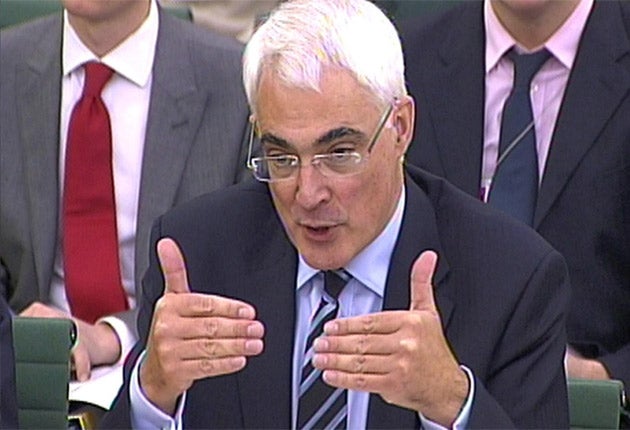Confidence falls on fears of 'double-dip' recession
ComRes survey shows a majority of businessmen detect no signs of recovery

Businessmen have become more gloomy about the economy in the past month, raising fears that Britain may slip into a "double-dip" recession next year.
A ComRes survey of 257 business leaders for The Independent found that the proportion detecting "green shoots" in their sector had dropped from 49 per cent in November to 36 per cent this month. For the first time since July, a majority (53 per cent) of businessmen now detect no signs of economic recovery, while 11 per cent are "don't knows".
The findings are a setback for ministers, who are keen to ensure that the return to growth they predicted for the final three months of this year is maintained next year. They are anxious to avoid slipping back into negative growth in the first quarter of 2010 because a general election must be held by June.
The number of business leaders who saw signs of recovery in their sectors rose from 38 per cent in August to 49 per cent in September but then remained flat before this month's unexpected dip.
The latest figure will confirm fears that the economy is fragile. Ministers will claim that the caution among business leaders vindicates their decision to continue government support for the economy next year rather than cut public spending as the Conservatives would do.
But the Tories expressed concern about the ComRes figures. Philip Hammond, the shadow Chief Treasury Secretary, said: "These findings send a worrying signal about the depth of Gordon Brown's recession and the fragility of business confidence. It's now more important than ever that we take action to restore confidence in our economy, with a credible plan to reduce the deficit faster, keep interest rates low and protect British jobs. The pre-Budget report (PBR) last week blatantly failed to address these issues and did nothing to reassure business or investor confidence in Britain."
Some senior Tories believe Mr Brown may be tempted to call a 25 March election to head off the prospect a "double dip" recession being announced before a poll on 6 May, the most likely date. With VAT rising from its temporary 15 per cent rate to 17.5 per cent on 1 January, there are fears that the first three months of next year will be sluggish.
The ComRes survey, taken in the five days after the Chancellor's PBR last week, found that it did nothing to enhance Mr Darling's reputation with business leaders. The number who have confidence in him has fallen from 25 per cent to 20 per cent since his statement. It was criticised by business organisations for not spelling out how the Government would meet its pledge to halve the £178bn public deficit over four years.
Confidence in Mr Brown has fallen from 20 per cent before the PBR to 17 per cent. George Osborne, the shadow Chancellor, enjoys a 45 per cent "confidence rating" and David Cameron is on 61 per cent. Mr Osborne outguns Mr Darling on a range of issues. Some 74 per cent of businessmen think that the Chancellor is "out of his depth", while 38 per cent say the same about the shadow Chancellor. Only 24 per cent believe Mr Darling "understands business", while 62 per cent say that Mr Osborne does.
More than half (56 per cent) of business leaders believe that Mr Osborne has the right ideas about how to manage the British economy and 65 per cent think he would make a better chancellor than Mr Darling. But 74 per cent believe that Mr Osborne "lacks experience".
The politician who enjoys the confidence of most businessmen, with 62 per cent, is the former chancellor Kenneth Clarke, who is now shadow Business Secretary. Vince Cable, the Liberal Democrat Treasury spokesman, enjoys a 58 per cent "confidence rating", with the Business Secretary Lord Mandelson on 34 per cent and the Liberal Democrat leader Nick Clegg on 26 per cent.
Join our commenting forum
Join thought-provoking conversations, follow other Independent readers and see their replies
Comments